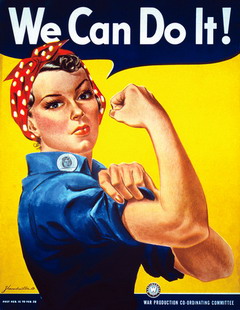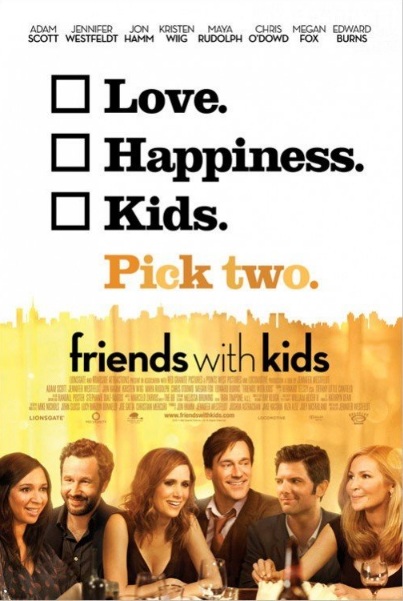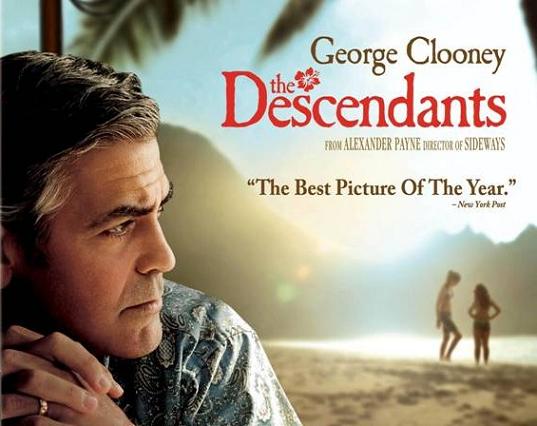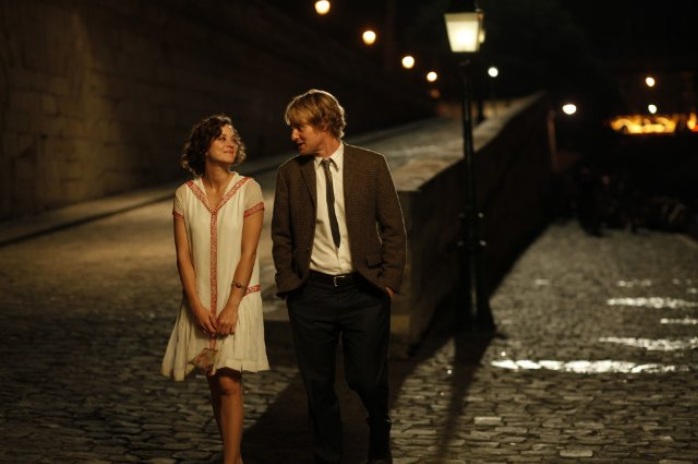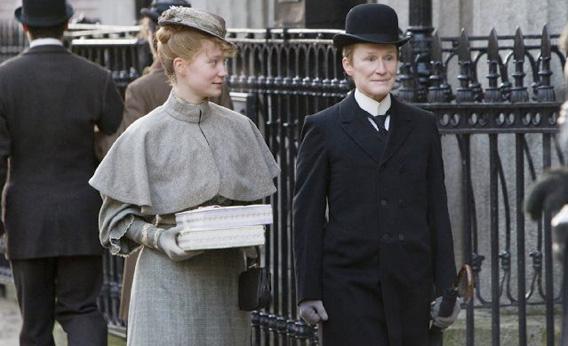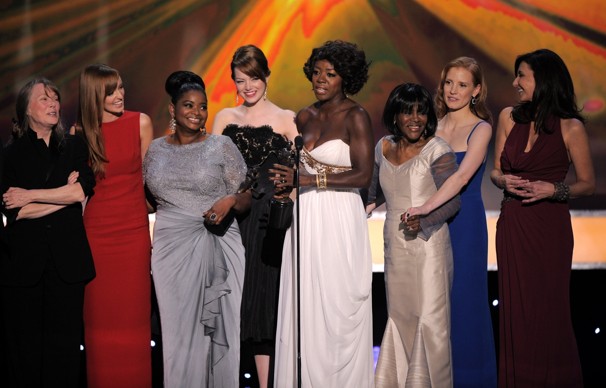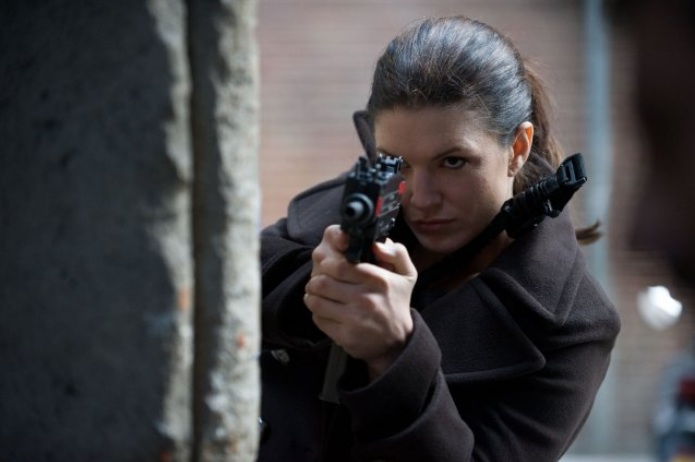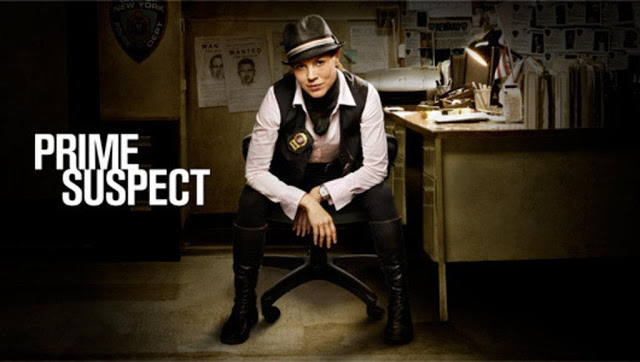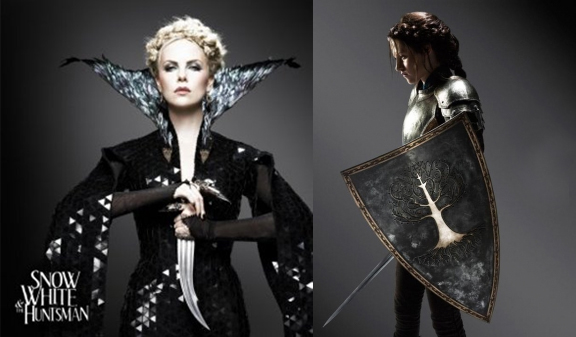“The way I watch movies, I’m really searching for myself because I don’t get to see enough of myself and I don’t, I kind of don’t get to like myself enough. But if I can see myself on-screen then I know I exist.”
Tag: Megan Kearns
‘Friends with Kids’ Preview: Leading a Stellar Cast, Writer/Director Jennifer Westfeldt Depicts an Unconventional Path to Parenthood
I’ve been excited to see Friends with Kids since last year when I heard it would reunite Bridesmaids castmates Kristen Wiig (omg do I love, love, LOVE her in Bridesmaids and on SNL!), Maya Rudolph (adore her in Away We Go and Up All Night), Chris O’Dowd (adorbs in Bridesmaids) and Jon Hamm (of course I swoon for Don Draper). When I discovered a woman wrote AND directed it, Jennifer Westfeldt in her directorial debut, my elation skyrocketed! No joke.
Written, directed, produced and starring actor Jennifer Westfeldt, Friends with Kids tells the story of two best friends Julie (Westfeldt) and Jason (Adam Scott), who decide to have a baby together while remaining platonic friends “so they can avoid the toll kids can take on romantic relationships.” It looks like a hilarious, awkward yet sweet ensemble comedy about friends navigating friendships, relationships and parenting.
A Tony and Indie Spirit Award nominated actor, Westfeldt is probably best known for her role as actor, co-writer and co-producer of the critically-acclaimed lesbian romantic comedy Kissing Jessica Stein. She also wrote and starred in Ira and Abby, a story of two strangers who get married. In an interview with Marie Claire, Westfeldt shared her inspiration for Friends with Kids, which stemmed from being out of sync with where your friends are in life:
“Four years ago, Jon’s and my friends started having babies, and everything became so kid-centric. You miss one-on-one time with your friend. When you’re childless and close friends become new parents, you suddenly feel left out, and that’s where the kernel of this idea came from.”
Being single doesn’t sound a death knell. Yet Hollywood would have you believe otherwise, especially if you’re a woman. The media also often shows only the glamorous, fairy-tale side of weddings, babies and relationships. I’m hoping Friends with Kids will tell a more authentic story. Too many people wait for their life to start, thinking events must progress in a certain order: college, career, marriage, home, baby. But why can’t you do things differently? Who’s to say you can’t have a baby without a relationship? Each of the 3 films Westfeldt has written share a theme of taking relationships and life choices and “turning the norm on its head,” choosing a different path than what convention dictates.
Earlier today, Melissa Silverstein wrote about the “depressing reality of women directed film in 2012” and how we need to generate more anticipation and buzz for upcoming films directed by women. With female writers comprising 24% of all writers in Hollywood, 17% in film and only 5% of women as directors, down from 7% in 2010 and 2009 (god that’s horrifying depressing and makes me cringe), it’s exciting to see a film written and directed by a woman that could potentially do well with both female and male audiences.
Now, I’m not saying films written, directed or starring women are automatically good. Some suck (although I always hate saying that since there aren’t nearly enough movies created by women). And I don’t know if Friends with Kids will be amazeballs, a feminist extravaganza! But I’m optimistically hopeful considering it co-stars two talented and hilarious female comedians (Rudolph and Wiig) and Westfeldt, the woman behind and in front of the camera, not only writes interesting female characters but also speaks openly that “there aren’t that many interesting roles for women in TV and film.”
We need to support women filmmakers if we ever hope for Hollywood to become more gender equitable. When Bridesmaids came out, Salon writer Rebecca Traister argued it was people’s “social responsibility” to go see it:
“Yes we can … buy tickets to a Kristen Wiig movie in an effort to persuade Hollywood that multidimensional women exist, spend money and deserve to be represented on film…we now inhabit an entertainment universe in which everything male-centered is standard, and everything female-centered is female…What that means in practical terms is that women will plonk down dollars to see a male-dominated action movie, a girl-gobbling horror flick, or a dude-centric comedy just as easily as they’ll pay for the kind of female-fueled movie that is literally made for them. Men, meanwhile, have apparently been so conditioned to find anything female emasculating (notwithstanding the expectation that their girlfriends find anything male, including “Thor,” scintillating) that they cannot be moved to sit through any movie with a fully developed woman at its center.”
Westfeldt wasn’t initially going to direct but she stepped into the role of director in order to remain on the tight filming schedule. But that doesn’t mean Westfeldt doesn’t recognize the importance and power of female filmmakers:
“It’s really been a year of sisters doing it for themselves. At Sundance there were, like, five movies where women were writing roles for themselves. And the success of women like Lena Dunham and Miranda July and Tina Fey and now Kristen [Wiig], among others; it’s a pretty cool time to see how much has evolved in that regard…I’m happy to be part of that wave, and I’m inspired by how much of that is going on. It feels like there’s a wave happening of women taking a little more control of their own creative fates.”
The Descendants: Review in Conversation
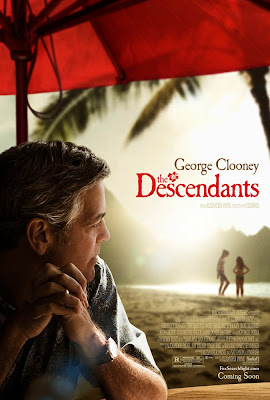 |
| The Descendants (2011) |
 |
| The King family and their land. |
Writers are using the Women in Refrigerators trope to literally trade a female character’s life for the benefit of a male character’s story arc.
 |
| Shailene Woodley as Alexandra King |
 |
| George Clooney as Matt King |
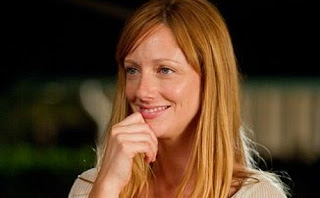 |
| Judy Greer as Julie Speer |
 |
| The patriarch, Matt King |
Women & Gender at the 2012 Indie Spirit Awards
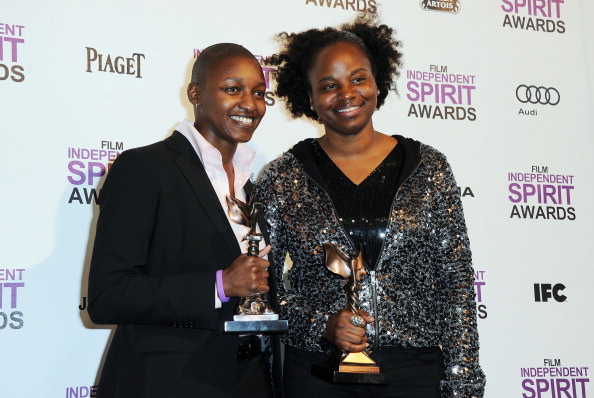 |
| (L-R): ‘Pariah’ Producer Nekisa Cooper & Writer/Director Dee Rees, winning John Cassavetes Award |
So I groaned the moment I discovered Seth Rogen was hosting the Independent Spirit Awards, which aired last Saturday night on IFC. I mean, after his shitshow appearance at the Golden Globes, making that sexual harassment comment to Kate Beckinsale on-stage, I’m all set with him. When announcer director John Waters (yep, you read that right) said he had “an erection just saying his name,” I thought for sure the show would be a sexist bonanza. Luckily, the Spirit Awards were fairly free of sexism and some interesting gender commentaries emerged.
“I honestly bet though Ratner really wishes he was organizing the Grammys because they seem much more forgiving than the Oscars altogether. Seriously, you say a few hateful things they don’t let you within a few hundred yards of the Oscars. You could literally beat the shit out of a nominee they ask you to perform twice at the Grammys.”
“They say there’s no good roles left for women. Which is bullshit, there is. You just have to play a man.”
 |
| (L-R): Best Supporting Female & Male Winners Shailene Woodley (‘The Descendants’) & Christopher Plummer (‘Beginners’) |
 |
| Best Female Lead Winner Michelle Williams (‘My Week with Marilyn’) |
When Michelle Williams won, in her endearing acceptance speech, she talked about being an outcast and finding acceptance. She said:
“I first came to the Independent Spirit Awards 10 years ago and I wore my own clothes which were not very good. And I cut my own hair which was also not very good. I remember, I still remember the feeling in this room, unlike others, that was okay. Possibly even preferred. And what I thought then, and still feel now, it’s because this is a room filled with misfits, outcasts, loners, dreamers, mumblers, delinquents, dropouts, just like me!“I want to say thank you for supporting me and welcoming me and making me feel at home in this room and in this community all the way back then and now, when the only thing that I own that I’m wearing is my dignity.”
“Margin Call, a movie about a bunch of Wall Street d-bags, beats Another Earth, a movie about a complicated woman #SHOCKING.”
“Any Saturday where you get to wear a sparkly hoodie and drink two whiskeys before noon is fucking awesome.”
“It’s about performance above all else.”
“It took a village to make this film.”
“You’ve got the spirit of murders, coma, cancer, schizophrenia, cancer, suicide, independence and dreams.”
“Now go out there and make your damn movie!”
Oscar Best Picture Nominee: ‘Midnight in Paris’ and Its Woman Problem
 |
| Marion Cotillard and Owen Wilson in ‘Midnight in Paris’ |
In Allen’s latest Oscar-nominated endeavor, Midnight in Paris, Gil Pender (Owen Wilson) is a successful Hollywood screenwriter struggling to write his first novel. He visits Paris with his constantly complaining fiancé Inez (Rachel McAdams), as he yearns to live amongst his literary idols in the Roaring Twenties. Gil discovers that at midnight, he is able to transport to 1920s Paris and hobnob with writers, musicians and painters. A love letter to Paris and artists, Midnight in Paris explores the dichotomy between illusions of nostalgia and pragmatically embracing the present.
Allen has a knack for evoking the visceral beauty of a city: NYC in Annie Hall and Manhattan, Barcelona in Vicky Cristina Barcelona, Paris in Midnight in Paris. With lush cinematography, Allen capturesthe seductive allure and breathtaking romance of Paris. He also infuses the film with myriad authors and artists from the 1920s, a bibliophile’s dream. These delightful distractions almost made me forget (almost) that while an okay film, it’s certainly not a great one.
Now, I didn’t hate Midnight in Paris like my kick-ass colleague Stephanie. But I totally understand why she did because it royally pissed me off too. The portrayal of women in this film is fucking problematic.
Kathy Bates is fantastic as writer and art collector Gertrude Stein. Yet she’s highly underutilized, striving to make the most of her small role. Incredibly influential, we witness Stein’s Parisian salon which attracted talented writers, like Ernest Hemingway and Ezra Pound, whom she advised and mentored. After reviewing his manuscript, Gertrude bestows Gil with her wisdom: “We all fear death and question our place in the word. The artist’s job is not to succumb to despair but to find an antidote for the emptiness of existence.” Aside from Gertrude, none of the female characters are either truly likeable, interesting or complex individuals.
Audacious Zelda Fitzgerald (Alison Pill, who tries her best to imbue her with charm), F. Scott Fitzgerald (Tom Hiddleston)’s wife and a writer in her own right, diminishes her artistic talent by saying, “…and I realize I’ll never write a great lyric and my talent really lies in drinking.”
An “art groupie” muse, Adriana (Marion Cotillard) designs couture fashion and becomes the object of Gil’s affection, despite his fiancé. When Gertrude reads the first line of Gil’s book aloud, Adriana praises it saying she’s “hooked” and later calls his musings on the “City of Light” poetic. Enamored with her, they begin to spend their evenings talking and walking around Paris. Cotillard is a divine actor. But her character is beige and boring. Although I must admit I’m glad Adriana ultimately chooses her own path.
In addition to seeking Stein’s advice on his book, Gil turns to another woman, an art museum guide (Carla Bruni), for advice on being in love with two women at the same time. Oh, and he also flirts with 25-year-old Gabrielle (Léa Seydoux) (cause you know, that’s what middle-aged dudes do) who sells old records from the Jazz Age and shares his love of Paris in the rain.
 |
| Owen Wilson and Rachel McAdams in ‘Midnight in Paris’ |
Now, I don’t automatically have a problem with a villainous or unlikeable female character, especially since there are so many female roles in the film. In fact, I often lament how unlike men, women are not allowed to play unlikeable or unsympathetic characters. But I have a huge problem with the “nag” role. The cliché of women as “nags” permeates pop culture.
I also have a huge problem that the seemingly sole reason Inez was made so horribly despicable was to “allow” Gil to cheat on his fiancé. The audience would sympathize with Gil for kissing another woman, buying her trinkets, baring his soul to her and planning to sleep with her even though he was engaged because his fiancé was such a shrew. Oh that’s right, I forgot! It’s okay to cheat on someone as long as they’re an asshole.
Allen told Rachel McAdams that she should play this role as she should “want to play some bitchy parts” as they’re more interesting. Maybe. But not this part. I didn’t find her character interesting at all. Yes, McAdams tries her best with the material she’s given. But the character is one-dimensional and annoying, lacking any depth or complexity.
Midnight in Paris, like pretty much all of Allen’s films, lacks diversity. They’re a sea of white with no people of color anywhere in sight. Oh I take that back. There’s a black woman in a car that Gil gets in on his “way” to the 1920s, one shot of Josephine Baker (Sonia Rolland) dancing that lasts all of 30 seconds and a few black people watching her dance.
Along with race, sexual identities are also omitted. The film contains three famous lesbians: Gertrude Stein, Stein’s life partner Alice B. Toklas (Thérèse Bourou-Rubinsztein) and writer Djuna Barnes (Emmanuelle Uzan). Of all three, Gil only alludes to Djuna’s sexuality when he says she led when they danced together. So lesbianism is almost completely erased, paving the way for good ole’ heteronormativity.
The only overt gender commentary occurs when Ernest Hemingway (Corey Stoll) says, “Pablo Picasso thinks women are only to sleep with or to paint,” but he believes “a woman is equal to a man in courage.” Which is interesting since Allen is a person who in his personal life doesn’t always believe equality in relationships is desirable: “Sometimes equality in a relationship is great, sometimes inequality makes it work.” (???) Yeah, this explains a lot. He also has a penchant for younger women, in his movies and in reality, because younger women are more innocent, “before they get spoiled by the world.” Gag.
I swear people nominated Midnight in Paris for so many awards because Hollywood is lazy. Rather than nominating ground-breaking, intelligent films like Pariah, The Whistleblower or Young Adult, this gets nominated because Allen is a famous, old, white male director. Good job, Hollywood. Way to keep perpetuating the dude machine.
The film suffers from a major woman problem. The women in the film are just as intelligent and talented as their male contemporaries. Gil turns to women for advice and guidance. Yet Allen reduces almost all of them to love interests and arm candy, nothing more than satellites to a dude.
‘Albert Nobbs’ Review: Exploring Constrictions of Gender & Class
 |
| Mia Wasikowska and Glenn Close in ‘Albert Nobbs’ |
Haunting and sad, Albert Nobbs tells the tale of a woman who disguises herself as a man in order to survive in 19th Century Ireland. A “labor of love” and a “dream fulfilled,” Oscar nominee Glenn Close, who co-wrote the screenplay, tried to get Albert Nobbs made into a film for 30 years. Adapted from the play, which Close starred in on Broadway in 1982, is itself adapted from George Moore’s short story. Moore’s books were controversial “because of his willingness to tackle such issues as prostitution, extramarital sex and lesbianism.” Rodrigo Garcia’s poignant film Nine Lives, which Close also appeared in, showcasing 9 vignettes of women’s lives, is one of my favorite films. So my expectations were high for Albert Nobbs.
Was this a “jaw-dropping performance” by Glenn Close? She was absolutely outstanding. I didn’t realize at first just how good of a job she did until I realized I completely forgot that it was Glenn Close! I’m used to seeing her play strong, confident or assertive women. Here, Close plays a character shy, awkward, guarded and desperately lonely. She melts into the role. She’s as straight-laced and tightly wound as the prim and proper world around her.
“Albert was particularly tricky because there’s always the question of how much should show on her face because a lot of it is somebody who’s totally shut down, who doesn’t even look people in the eye. Servants weren’t supposed to look people in the eye, but she’s an invisible person in an invisible job. And then her whole evolution is slowly being able to look up – the first time she really looks someone in the face is after she’s told Hubert her story and then she kind of looks out to her dream.”
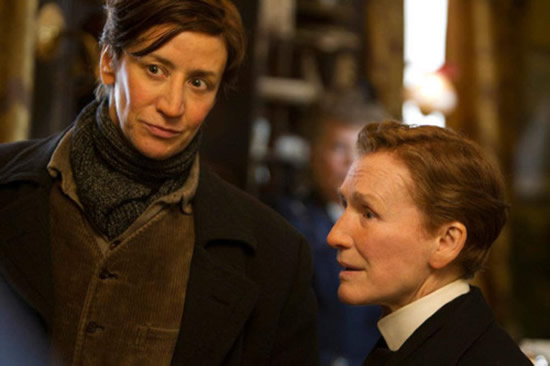 |
| Janet McTeer and Glenn Close |
“I tried to be, on the one hand, very male, by which I mean large and expansive and confident and sitting on the back of the heels, as it were, and on the other hand I wanted [my character] Hubert to have as many as what we consider to be the loveliest of the female qualities — empathy, compassion, kindness. I wanted Hubert to be a really good mixture of both.”
After Albert meets Hubert, she realizes she could have a life of companionship. SPOILER -> Hubert is married to a woman she adores and a beautiful scene between the two portray a tender, loving and devoted couple. <- END SPOILER Hubert gives Albert hope for a different future: a life free from the shackles and confines of loneliness. In a bittersweet scene, Hubert and Albert walk along the beach together. Albert in a dress, the first she’s worn in 30 years, runs along the beach. Reminded of her old identity, in a rare expression of emotion, she’s unconstricted, buoyed by freedom and sheer joy.
Many movies contain cross-dressing plotlines for comedic effect. But not a lot exist that focus on gender-bending from a dramatic angle. Boys Don’t Cry and Transamerica explore the lives of a trans man and woman while Yentl and The Ballad of Little Jo both echo Albert Nobbs as they feature women who choose to live as men in order to survive or pursue their dreams. An act of violence as a young girl catalyzes Albert to live as a man to protect herself and survive.
Critics have focused on the gender components. But class, an equally important theme, threads throughout the entire film. Albert Nobbs depicts how women contended with and endured poverty. We witness the stark dichotomy between the lavishly wealthy clients and the servile wait staff in the hotel. Servants in the Victorian Era were to be invisible, never looking the upper class in the eye. With her downcast eyes, Albert remains dutiful. Yet she begins to aspire for more. Albert has been saving her money all her life and hopes to open a shop of her own.
The film portrays relationships and courtship as an economic contract. When Albert courts the coquettish Helen (Wasikowska), Helen expects and asks for all sorts of gifts and trinkets. SPOILER -> We also see class play out after Helen gets pregnant. Women needed men in order to survive financially. Women who give birth to children out of wedlock were punished fiscally, fired from their jobs. Husbands provided fiscal security. <- END SPOILER Gender and class coalesce. You realize Helen’s gender and station in life condemn her situation. Albert and Hubert would never be able to attain their dreams (and Hubert her independence) had they retained their identity as women.
I perpetually worry audiences watch period films with dangerously confining gender roles and then sit back thinking, “Phew, we’ve come so far!” Yeah, no, we so haven’t. Albert Nobbs raises so many thought-provoking questions. Why is the male gender the more “desirable” gender in society? What does it say about a society where half its population has a mere two options for their lives? How can women take charge of their own lives amidst confining gender norms? But therein lies my problem with the film. It provides no conclusions, the answers remain elusive.
The tragic story of Albert Nobbs lingered in my memory long after I left the theatre. Its exploration of female friendship, lesbian love, class and poverty, gender roles and a woman’s self-discovery, truly make it a rare gem.
Viola Davis Rules the Night: Women, Race & Gender at the 2012 SAG Awards
 |
| Viola Davis and the cast of ‘The Help’ at the 2012 SAG Awards |
When Christopher Plummer won Outstanding Male in a Supporting Role for his performance as a gay man coming out to his son in Beginners, he began his acceptance speech by saying he’s “had such fun in the world’s 2nd oldest profession.” Ah, a sex work joke. Then Plummer called the film’s female producers “girls.” Oh Christopher Plummer. Yeah, calling female producers “girls,” even if they are way younger than you, not cool. But he almost redeemed himself when he again thanked his wife of 43 years who “came to his rescue and saved his life.” Swoon!
Dick Van Dyke presented icon Mary Tyler Moore with a Lifetime Achievement Award. I’ll start with what I liked. I LOOOVE that Van Dyke mentioned that Mary Tyler Moore is an animal rights advocate!!! The vegan in me cheered with delight. Ah, but the feminist in me shook my head at this:
“She’s one of the few performers, women, who can do a flat out comedy scene, slapstick and still be beautiful, feminine and adorable.”
Now, I realize he’s old and comes from another era. Don’t care. When discussing someone’s work or talent, male or female, their looks shouldn’t be mentioned. Society focuses too much on women’s appearances. People often assume women can only embody one quality: smart or sexy, funny or beautiful. As if a talented woman isn’t a success unless she’s pretty and feminine too.
When Octavia Spencer won Outstanding Female in a Supporting Role for The Help, she honored civil rights activist Medgar Evers in her poignant acceptance speech. She also said,
“Thank you for putting me in a category with so many beautiful women…It was really a privilege to work on a film that gave a voice to so many women…By honoring me, you honor them…
“I want to thank all the people out there who went to support this movie and, after watching it, felt something. You felt compelled to make a change in your lives. So I’m going to dedicate this to the downtrodden, the underserved, the underprivileged, the overtaxed, whether emotionally, physically or financially.”
Other great moments included winner Alec Baldwin giving a shout-out to Tina Fey for her witty writing on 30 Rock (damn straight) and winner Betty White thanking her 3 female co-stars, Valerie Bertinelli, Jane Leeves and Wendie Malick, on Hot in Cleveland. Loving the female camaraderie!
And speaking of female camaraderie…love, love, LOVE Maya Rudolph, Kristen Wiig and Melissa McCarthy as presenters!!! The comical trio sauntered on stage to present the clip of Bridesmaids, one of my favorite 2011 films, nominated for Outstanding Ensemble. In describing the film, Maya Rudolph said,
“Our cast tells the story of strong female friendships.”
“Do you think Scorsese saw Bridesmaids??”
When presenters Tina Fey and John Krazinski discussed advice given to actors, Fey hilariously said,
“And I believe it was the TODAY show’s fourth hour co-host Kathie Lee Gifford who said, ‘If drag queens love you, you’ll have the longest career in the world. They know phony and they know real.’”
When Viola Davis won Outstanding Female Actor in a Lead Role, the audience gave her a standing ovation. Davis is a phenomenal actor who makes the most of any role she plays. Whether on-screen for hours (The Help) or mere moments (Doubt), her quiet strength mesmerizes and enthralls. Christ she almost made Nights in Rodanthe watchable (almost). Davis shared how she decided to become an actress at 8 years old. Cicely Tyson inspired her, and she was thrilled she could see her idol sitting in the audience as she won her award. Davis said,
“What is there but a dream? You can’t trade in your dream for another dream…Dream big and dream fierce.”
Bolstered by a female ensemble, The Help was the big winner of the evening. Not only did it win the two female acting awards. And I have to say that I’m ecstatic two unbelievably talented African-American women won. But it also won Outstanding Performance by a Cast. At first, I was pissed Bridesmaids didn’t win. Then I was even more pissed that The Help won; a film touted as showcasing black women’s experiences but actually revolving around a white woman “saving” black women. But then I let Davis’ eloquent and inspiring words wash over me.
After calling working on The Help “a labor of love,” Davis articulated:
“The stain of racism and sexism is not just for people of color or women. It’s all of our burden. It’s all of us. I don’t care how ordinary you may feel. We all of us can inspire change. Every single one of us.”
Racism and sexism affect us all. More people must realize racism and sexism still exist, stripping people of equality. We need white allies and male allies working with people of color and women towards eradicating racial and gender discrimination. We must speak out whenever we see or hear prejudice or injustice if we ever hope to combat it. But all is not lost. We can all make a difference.
People often go to the movies for entertainment, to escape their mundane lives. But films can also inspire you to act boldly and dream big. And sometimes, awards shows can too.
Rape Jokes Are Taking Over TV and I’m Sick Of It
“If you go back there, you’ll need a bite guard and a rape guard.”“That’s not what rape feels like.”
“Rapists don’t knock and wave.”
“Stop fighting it, just give into it. I don’t know why I’m quoting a rapist.”
“Somebody date raped me and I didn’t think I’d live through it. But I did and now I’m stronger and uh, still needy.”
“If a rape van was called a surprise van more women wouldn’t mind going for rides in them. Everyone like surprises.”
“As a woman, I’m going to have to ask you to stop comparing prostate exams to the pinball scene in The Accused. It’s not okay.”
“The fact that people find these lines fun, or funny, is systematic of our society, where 60 percent of sexual assaults are not reported to police precisely because of the perceived lack of seriousness toward rape (along with stigma and victim-blaming/shaming, among other reasons).”
“For so long all of our energy has been directed at women, teaching them to be more “ladylike” and to not be “promiscuous” to not drink too much or to not wear a skirt. Newsflash: men don’t decide to become rapists because they spot a woman dressed like a video vixen or because a girl has been sexually assertive.“How about we teach young men when a woman says stop, they stop? How about we teach young men that when a woman has too much to drink that they should not have sex with her, if for no other reason but to protect themselves from being accused of a crime? How about we teach young men that when they see their friends doing something inappropriate to intervene or to stop being friends?
“The culture that allows men to violate women will continue to flourish so long as there is no great social consequence for men who do so.”
“I am over people not understanding that rape is not a joke and I am over being told I don’t have a sense of humor, and women don’t have a sense of humor, when most women I know (and I know a lot) are really fucking funny. We just don’t think that uninvited penises up our anus, or our vagina is a laugh riot.”
‘Haywire’ Review: Gender and an Ass-Kicking Woman
 |
| Gina Carano as Mallory Kane in ‘Haywire’ |
Who is Gina Carano? That question might haunt you after watching Haywire or seeing its trailer. We need more women in films, especially in the action genre. But is having a film revolve around a tough, smart female protagonist who kicks ass enough to change gender roles on-screen?
With an impressive supporting cast (Michael Fassbender, Ewan McGregor, Michael Douglas, Antonio Banderas), Haywire centers around Gina Carano as Mallory Kane, an ex-Marine black ops expert assigned a dangerous mission to rescue a journalist. When she’s double-crossed, she goes on the run, playing a deadly game of cat-and-mouse to uncover the truth. Told in a non-linear narrative, the interesting plot ensnares you in the action and web of deceit.
Carano gives a solid performance in a good (not great) movie, especially considering she has practically no acting experience. Like stuntwoman-turned-actor Zoe Bell, she didn’t get her start in acting. Instead, Carano forged her career in MMA (mixed martial arts). Nicknamed “Conviction,” Carano is known as the “Face of Women’s MMA,” a title she herself refutes. In only her second film, Carano headlines Haywire, catapulting her into the Hollywood limelight.
Director Steven Soderbergh said he was frustrated as a filmgoer. He was tired of watching action films lacking visual aesthetics. So he set out to create an action film “beautiful to look at.” As he flipped through the TV channels one night, Soderbergh stumbled upon Gina Carano beating the shit out of another woman in a match. She struck a chord in him and he wanted to build a project around her, an authentic action film. Rather than having a female actor undergo grueling training or hire a stunt double, he submerged Carano, a highly accomplished champion Muay Thai fighter, into method acting, including having a former Mossad (Israeli intelligence) agent ambush her outside a hair salon. Okay, that’s just ridiculous! Soderbergh asked Ryan Kavanaugh, head of Relativity Media:
“’Why is Angelina Jolie the only female action star in the world?…Because someone made her that way, and I’m going to make Gina into one of the biggest action stars in the world.”
 |
| Mallory Kane (Gina Carano); ‘Haywire’ still frame |
Another interesting component happens when Mallory seduces a man. I usually don’t like when a woman has sex in an action film as it usually reduces her identity to her sexuality and her relationship with a man defines her. But here it’s unusual because you don’t often see women as the initiator, not for any other motives other than she wants to have sex. I kinda like that.
Sadly, besides Carano, Haywire is adrift in a sea of men, men, men as far as the eye can see. Her employers, colleagues, villainous foes, the guy she accidentally carjacks….all men. Salt suffered that problem too. But Hanna, another female ops action film, not only had several women in it but included female friendship and cooperation. Sadly, that’s lacking here. They could have included both her parents in the film so we at least see her interact with another woman. But nope. It’s only her dad…yet another dude.
Putting a tough, smart and capable woman front and center, Haywire is a step in the right direction. And I always love seeing fierce ladies kick ass. But we don’t live in a world that revolves around men. Oh wait, yeah we do. It’s time we changed that…on-screen and in reality.
Saying Goodbye to ‘Prime Suspect’ and One of My Fave Badass Female Characters
 |
| Maria Bello as Detective Jane Timoney on NBC’s “Prime Suspect” |
 |
| Detective Jane Timoney (Maria Bello) “Prime Suspect” |
In the premiere, the sexism Timoney faces jars and appalls. As a woman, she’s entered a perceived male domain. Her male colleagues insinuate and (some outright say) that she doesn’t deserve to be in homicide as she only got transferred to the department after sleeping with a chief. She faces the wrath of her co-worker, Detective Duffy, who accuses her of leading a homicide case only because another detective died of a heart attack. To their chauvinistic paradigm, she’s transcended boundaries and they’re going to make sure she knows it. When Timoney finds another angle to the case and gets information out of a witness that the previous detectives hadn’t. Calling her a bitch (by implying she’s a witch), Detective Carter snarkily asks her:
Carter: You ever worry that someone’s gonna drop a house on you?Timoney: Car’s not going to drive itself, is it?Carter: I guess you don’t.
“Obviously, it’s 2011. There’s no institutionalized sexism. There’s human resources. Women have recourse at work when things happen. “Prime Suspect” [will] try to make it more realistic, because sexism isn’t gone. It’s kind of more subtle and insidious in a modern world, and that’s what we’re going to try to do.”
What? No institutionalized sexism?? I’m not sure what world Cunningham lives in but sexism, both blatant and subtle, still very much exists.
As the show progresses, we see Detective Timoney collaborate with her colleagues. We see the hilarious friendship and banter between Detectives Blando and Calderon. We also see Timoney clash with her co-workers, boss, her loving boyfriend, her protective father and her vegan sister (yay a vegan!). Detective Timoney might be a hard-ass. But she’s also funny as hell. Here are some of Jane Timoney’s quips throughout the season:
Timoney: I love to know where the crime scene isn’t.Timoney: Ever seen a duck? Yeah, they don’t chew either. You just ate that hot dog like a duck.Hypnotherapist: You don’t seem to be in the right head space to quit smoking right now.Timoney: I don’t just want to smoke right now. I want to shove a pack of cigarettes in my mouth and light it with a blowtorch.Timoney: You look tired means you look old. You look short. How’s that feel?Duffy: Do you know what your problem is?Timoney: Oh, why limit it to just one?
 |
| Detective Jane Timoney (Maria Bello) in “Prime Suspect” |
In addition to sexism, the show also broached racism. In one of the episodes, 10 of Detective Timoney’s colleagues get pulled from a case of a murdered Latina to work on the murder of a pretty white female who’s an NYU student. Timoney tells the Chief:
“You’re making their point for them. You couldn’t have done it better…When it’s a missing brown girl, from a nobody family, it’s an afterthought.”
While I wish the show had delved deeper, I was thrilled this line appeared at all. Rarely does a TV show with a white protagonist tackle the intersection of racism and sexism.
Prime Suspect also makes interesting gender commentaries when Detective Timoney interacts with other women. There’s another female detective, Detective Carolina Rivera, who all the men flirt with. She’s coquettish and friendly in return. It’s a stark contrast to Detective Timoney’s no-nonsense, straight-forward style. She doesn’t care if the men like her. She’s there to do her job. Timoney also differs from her boyfriend’s ex-wife, Trish, who she often has to communicate with since her boyfriend and Trish share a young son. Trish often makes snide remarks about her carrying a gun or her line of work, especially when it co. Timoney isn’t a girlie girl. And she’s no pushover. In a great scene, after Trish asks Timoney what happened to her face (which is cut and bruised from fighting with an arrested suspect):
“Listen to me: I work terrible hours, often have to leave things early, I arrive to things late. I get phone calls in the middle of the night and all day long. I’ve never been shot, but I’ve been stabbed. I’ve had lye thrown in my face once, and I’m a homicide detective, Trish. Not a policeman or a policewoman. I’m also not a divorce lawyer, but I know about going to court.”
In “Underwater,” my fave episode so far, Timoney and Duffy go on a road trip to protect a little girl. Timoney grows fond of her, telling her she doesn’t like many people but that she likes her. While she’s close with her father and boyfriend, she has seemingly chosen not to have children of her own. In an episode where a man has beaten his wife and murdered her, he asks Detective Timoney why she doesn’t have children. She replies:
“I don’t know. Lucky.”
It’s rare for a female protagonist not to want children. Films, TV series and ads perpetually tell us all women want to have babies. If they don’t, they must be damaged, deluding themselves or they just haven’t found the right man yet. Because you know silly ladies, our lives revolve around men.
 |
| Detective Jane Timoney (Maria Bello) in “Prime Suspect” |
In “The Sad Death of Prime Suspect,” Melissa Silverstein laments Prime Suspect’s cancellation. She also talks about the difficulties of centering a show around a female protagonist:
“One thing this show made me notice is how it is easy to write a TV show starring a man and have female and male supporting characters surround that lead, but that it is way harder to write a show about a female lead and to create a realistic ensemble around her.“One of the issues with this show is that there were no other female credible characters on the show. It’s too much baggage for the female lead. She has to respond to the pretty cop who comes in and flirts, she has to deal with the crazy demands of her boyfriend’s ex, she has a crazy sister (where did that come from?). None of those women was a peer or someone she could have a decent conversation with to get her away from all the testosterone.”
Trailers for ‘Snow White & the Huntsman’ and ‘Mirror, Mirror’ Perpetuate Stereotypes of Women, Beauty & Aging and Pit Women Against Each Other
 |
| Charlize Theron as Queen Ravenna and Kristen Stewart as Snow White in ‘Snow White and the Huntsman’ |
In the hyped Snow White and the Huntsman, the infamous fairy tale transforms into a macabre Lord of the Rings-esqe action-adventure epic. Charlize Theron (love her!), a phenomenal actor who imbues her nuanced characters with depth, based her performance of the obsessive queen on Jack Nicholson in The Shining. Sounds interesting so far, right?
The intriguing trailer focuses heavily on Queen Ravenna (Charlize Theron), who narrates or speaks almost exclusively. Okay, I kinda like that. But why doesn’t Snow White (Kristen Stewart) say anything? Why does it seem in every trailer for one of her films (ahem, Twilight series) Stewart’s character mute?? And why the fuck did they have to add “The Huntsman” in the title?! Why couldn’t it have just been “Snow White?” Or “Snow White and the Queen?” Heaven forbid a film focuses on multiple women…without a dude.
In the Snow White fairy tale, the Queen rules the kingdom she stole from heiress Snow White. But as Rebecca Cohen points out, in film versions like Snow White and the Seven Dwarves, we never see the Queen actually do anything regarding political machinations other than obsess over maintaining her fading beauty and plot to kill her stepdaughter. She possesses no ambitions beyond eternal beauty. Sadly, this film seems no different.
 |
| Queen Ravenna (Charlize Theron); ‘Snow White and the Huntsman’ |
“Do you hear that? It’s the sound of battles fought and lives lost. It once pained me to know I am the cause of such despair. But now, their cries give me strength. Beauty is my power.”

Not to be outdone, the family-friendly comedy Mirror, Mirror is also tackling Snow White. While Snow White at least speaks in this trailer, Mirror, Mirror again puts the spotlight on the Queen, this time played by Julia Roberts. In this version, the Queen isn’t envisioned as evil, just insecure. All throughout the trailer, Queen Clementianna (Julia Roberts) makes snide comments about Snow White (Lily Collins)’s beauty and how she herself isn’t getting wrinkles but “crinkles.” We see her girdle getting cinched. She uses a love potion on the rich prince, whom she wants to marry to cure her “financial troubles.” So Roberts’ Queen doesn’t even seem faux empowered like Theron. Instead she’s reduced to a shallow, insecure, bitter woman. How funny!
Now, the original Snow White isn’t an enlightened, gender equitable, female empowerment tale. Young woman plays housekeeper, cooking and cleaning for a bunch of dudes after her stepmother banishes her to the woods, who then falls into a coma after eating a poisoned apple by said stepmother, awakened with a kiss by a prince with whom she rides off into the sunset – not exactly screaming feminism. If Hollywood wanted to retell this story, why not put a twist on it?
And that’s what Snow White and the Huntsman attempts to do. In this version, Snow White (Kristen Stewart) is an armor-wearing, sword-wielding badass. Screenwriter Evan Daugherty wanted to update the fairy tale:
“What if, instead of saving Snow White, the Huntsman teaches Snow White to save herself?”
 Oooh a warrior Snow White! Potentially promising. And I like the idea of her saving herself. Except that Snow White (Kristen Stewart) is trained by…you guessed it, a dude. The Huntsman, initially ordered by Queen Ravenna to kill Snow White and cut out her heart so the Queen can consume it and live forever, decides to protect Snow White and train her for combat.
Oooh a warrior Snow White! Potentially promising. And I like the idea of her saving herself. Except that Snow White (Kristen Stewart) is trained by…you guessed it, a dude. The Huntsman, initially ordered by Queen Ravenna to kill Snow White and cut out her heart so the Queen can consume it and live forever, decides to protect Snow White and train her for combat.
“I’ve read so many stories where the prince saves the princess. It’s time we changed that.”
Snow White may be more of a badass in these retellings. But that doesn’t mean she’s feminist. The trailers for upcoming Snow White and the Huntsman and Mirror, Mirror spread a message of women, beauty and aging. They pit women against each other, particularly older women against younger women. They tell us that older women obsess over their looks, forever jealous of innocent younger women’s youth and vitality. They reinforce cattiness and competition, tossing aside the importance of female friendship and camaraderie. Oh silly ladies, you don’t need to rely on other women or even yourself. You just need a strong man to rescue you.
Really, Hollywood, haven’t we seen enough of these tired tropes? How about a truly empowered woman. Or better yet, a film with several strong female characters, who are friends, not foes. Now that, not a woman swinging a sword, would be truly radical.
—–
Trailers for Snow White and the Huntsman and Mirror, Mirror:
In ‘The Girl With the Dragon Tattoo’ Remake, Rooney Mara’s Captivating Portrayal Proves Lisbeth Salander Still a Feminist Icon
 |
| Lisbeth Salander (Rooney Mara) in “The Girl With the Dragon Tattoo” |
Lisbeth Salander consumes my thoughts. I’ve spent the last year and a half reading, writing, analyzing, debating and discussing the punk hacker. As a huge fan of the books and the original Swedish films, I was NOT excited to see The Girl With the Dragon Tattoo Hollywood remake.
Plagued by sexist marketing that seemed to focus solely on Mikael and depict Lisbeth as a sexpot damsel in distress, I feared Hollywood would wreck one of the most unique female protagonists in pop culture. With trepidation, I watched David Fincher’s take on Stieg Larsson’s epic. While some gender problems arose, I’ve got to admit I was pleasantly surprised. And it all hinges on Rooney Mara’s performance.
For those who don’t know, The Girl With the Dragon Tattoo, the first part in the global phenomenon of The Millennium Trilogy, features disgraced crusading journalist Mikael Blomkvist (Daniel Craig) and brilliant researcher Lisbeth Salander (Rooney Mara) who unite to solve the mystery of a woman who disappeared 40 years ago. The gritty, tense plot fuses with social commentary on violence against women, sexuality and gender roles.
Do we really need an American remake? Fincher, a notoriously obsessive and detailed filmmaker, creates a gorgeous film evoking a macabre ambiance. Trent Reznor’s eerie and haunting score punctuates each slickly stylized scene perfectly. Phenomenal actors fill the screen: Craig, Robin Wright (who I will watch in absolutely anything), Christopher Plummer, Stellan Skarsgaard, Vanessa Redgrave. While everyone does their best, the remake isn’t quite as compelling as the original. I never really felt invested in any of the characters. Except for Lisbeth. The sole reason to see the film is Mara’s stellar portrayal.
Lisbeth Salander is a role of a lifetime. Both Noomi Rapace (in the original film) and Mara underwent grueling auditions and year-long transformations including haircuts, body piercings (ears, eyebrow, lip, nose, nipple), nudity, kickboxing workouts, and learning skateboarding and motorcycle riding. A sullen introvert, Lisbeth is strong, fiercely independent and self-sufficient. She possesses a razor-sharp intellect and relentless survivor instincts. She’s endured horrific trauma and betrayal yet refuses to be a victim.
Fincher obstinately fought for Mara as Sony Studios didn’t want her for the part. After watching the film, I can see why Fincher refused to concede. It’s hard to dissect Mara’s Golden Globe-nominated performance and pinpoint precisely what she does that makes her so compelling. And that’s because as Melissa Silverstein writes, she “disappears into the role.” When Lisbeth greets the people she cares about, her guardian Holger Palmgren and Mikael, she frenetically says, “Hey, hey,” a small detail adding depth and nuance to the character. It’s in the clipped cadence of her voice, her slumped shoulders, her wounded eyes. Mara doesn’t merely play Lisbeth. She becomes her.
 |
| Lisbeth Salander (Rooney Mara) and Mikael Blomkvist (Daniel Craig) |
But I loved them both. For me, neither one is better. Both bring something unique conveying different facets of Lisbeth’s personality. They belong to two sides of the same coin. Mara, who had ginormous shoes to fill with Rapace’s ferocious portrayal in the original, gave a captivating performance. I’m glad the shitty marketing didn’t keep me away or I would have missed one of the best performances of the year.
People have simultaneously praised and condemned The Girl With the Dragon Tattoo for its graphic depiction of rape. The American version doesn’t shy away from the brutal scene. We live in a rape culture often glorifying or dismissing rape and violence against women. Author Larsson tried to show the epidemic of misogyny. The book (originally entitled Män Som Hatar Kvinnor, which translates to “Men Who Hate Women”), original Swedish film and Hollywood remake confront the stigma of sexual assault. Yet it never feels exploitative. Lisbeth refuses to be victimized. She follows her own moral compass exacting vigilante justice. She doesn’t possess traditional power. So she works within the confines of patriarchy to assert herself and take control of her life.
A huge part of the book (and the entire trilogy) is Lisbeth and Mikael’s friendship. Despite his social nature and her private behavior, they both stubbornly follow their own moral code. He’s continually surprised and amused by her unconventional comments and reactions. Mikael’s openness, humor and honesty allow Lisbeth to trust him, something she does so rarely. The movie doesn’t shirk their sexual relationship yet never captures their emotional bond. Lisbeth and Mikael also exhibit overt sexualities. Lisbeth possesses a sexual fluidity, sleeping with both women and men. Yet society views Mikael’s philandering as socially acceptable and perceives Lisbeth as an outcast. It’s a crucial gender commentary absent from the film.
But my biggest problem with Hollywood’s The Girl With Dragon Tattoo lies in one sentence. One teeny tiny sentence that threatens to unravel all of the painstaking work Mara put into her performance. SPOILER!! -> In the scene where Mikael has been cut from the noose, Lisbeth intends to run after his murderous perpetrator. She asks him, “May I kill him?”
 |
| Lisbeth Salander (Rooney Mara) |
“I think that she is many things to many different people…I was fascinated by the fact that 60-year-old men, you know 58-year-old women, 17-year-old girls were all finding something about her that was you know freeing or empowering in some kind of way. And it had been kind of sold to me as this you know misogynist avenger. But what I felt about it was ultimately that there wasn’t any kind of real feminist tract to it all.
“To me, it was very human. It’s a story of being oppressed, a story of being marginalized, a story of being made to feel less than, it’s a character that’s been made to feel less than who she thinks she is…”
Lisbeth combats misogyny and sexism. She abhors violence against women and avenges injustice. She refuses to be taken advantage of, always asserting her control. She surrenders to no one. She strives for empowerment, living life on her own terms. I agree Lisbeth wouldn’t call herself a feminist, just as she doesn’t identify as bisexual, since she doesn’t want labels confining her identity. Neither her gender, her appearance, nor her sexuality define her. Lisbeth defines herself. Every single one of these components reinforce a feminist message.
Despite Fincher and Mara’s insistent refusal, both The Girl With the Dragon Tattoo and its heroine are feminist. Saying otherwise completely misses the point of what makes Lisbeth Salander such an exhilarating icon.
